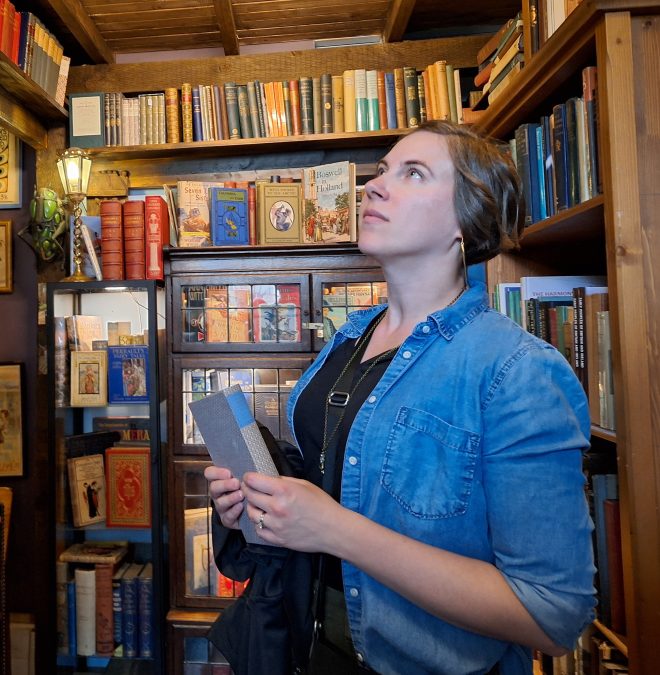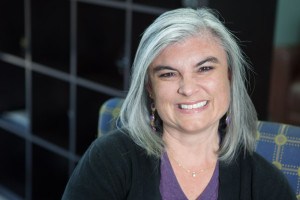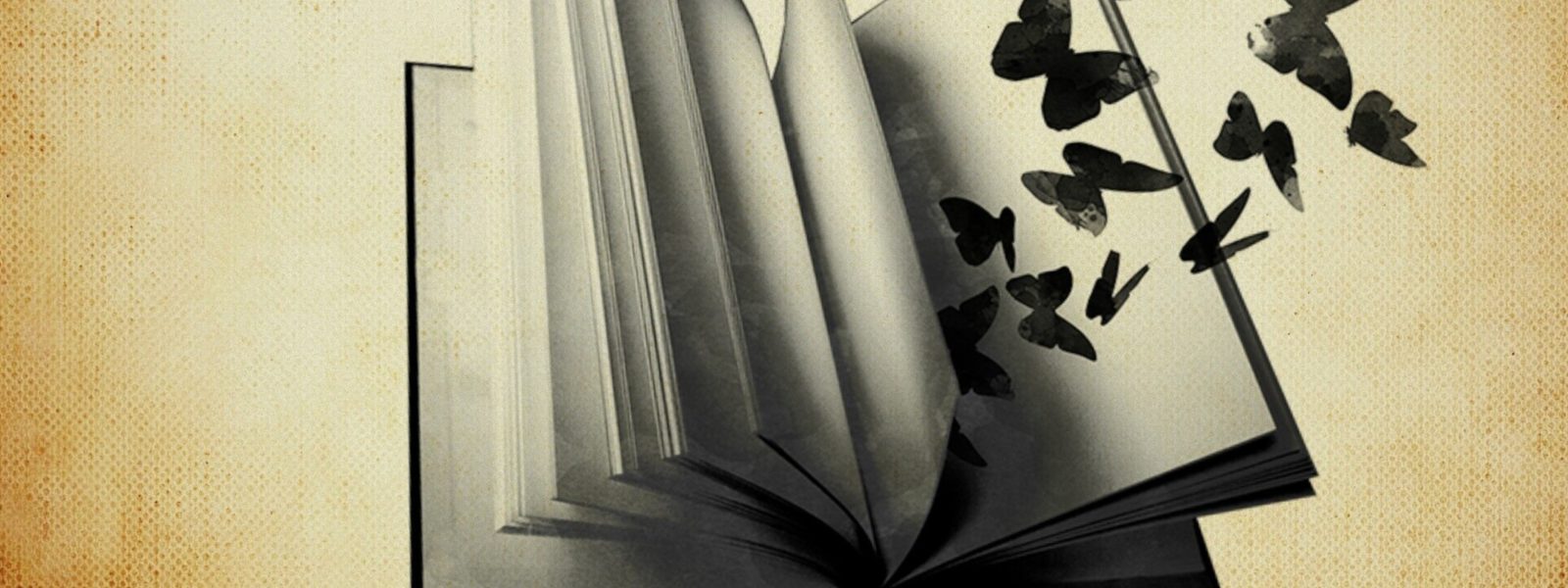Cast of Wonders 658: Your Hold is Ready
Your Hold Is Ready
by Laura Duerr
The news is spreading. We try to keep working through our English tests, but it’s becoming impossible to focus. Laughter and drumming call us to join the crowds on the streets, as irresistible as Odysseus’ sirens. I imagine myself tied to my desk chair, ears plugged up with wax instead of noise-canceling headphones, and chuckle to myself.
Mr. Lanigan leans around his monitor. “Molly, did you just giggle?”
“Possibly?”
Two storeys down, the crowd erupts with cheering. The students nearest the windows peer out wistfully. So does Mr. Lanigan. He ought to be retired by now, but he’s still here, and we’re glad. He’s kept a lot of our secrets and we’ve kept his. At first it was weird to watch out for someone so much older than us, but he stood up for us every chance he got, and somehow, together, our ordinary classroom discussions became outlets for us to be ourselves: to give voice to the dreams and hopes that had miraculously survived not just high school, but high school under all this.
It’s strange to think that those dreams and hopes might be safe out in the open again.
Principal Rodman lets herself in and stands by the door, arms folded. The room quiets, excited whispering falling into a silence that is half anticipatory, half fearful. She frowns at us, some of her thin black braids falling into her face.
“I thought you all had doctor’s appointments or something. Doesn’t everyone have to go to the dentist today? Aren’t you all going to be late?”
Daveed and Matty in the back row figure it out first. They leap to their feet and grab their coats.
“Yeah, I’ve really gotta get this cavity looked at.”
“Boy, my…uh…knee has really been acting up!”
Others join them, swarming past Mrs. Rodman and out the door. Mr. Lanigan arches one gray eyebrow at me.
“I don’t know about you, missy, but I definitely have an urgent appointment.”
“What about the test?”
“For goodness’ sake, Molly, you pass.” He shuts down his computer and pulls on his jacket, grinning. “You all pass today.”
Mrs. Rodman winks at me as we pass her. We both press fists to our hearts as the elevator door closes.
On the ground floor, Mr. Lanigan spots someone in the crowd flowing through the foyer and lunges out of the elevator like a man half his age. He and the trim, balding man he’s called his roommate for years pick each other out like they’re the only two people in the world, and they embrace like it, too. Cheering envelops them. I wave good-bye and make my way alone into the streets.
It feels like the whole city is out partying. I haven’t seen crowds this big since the protests, but the energy couldn’t be more different. The skies are clear of drones and the cameras installed on street corners are blinded by pink spraypaint. No one’s whispering out here: they’re singing, shouting, cheering, cries of “he’s gone” bubbling out of throats already hoarse from celebration.
Now that we can let it all out, I realise we’d forgotten just how much we were keeping closed in. Whatever the opposite of Pandora’s box is, it’s this: every joy, every gratitude, every relief, every delight they tried to deny us retaking their rightful place in the world.
I text my parents that school’s been let out and tell them where I’m headed. I weave down the street between rambunctious dancers and couples (and trios) who no longer have to care who sees them kissing. I turn the corner and break into a run like Mr. Lanigan returning to his partner, though it’s not a person I’m running towards, it’s a building. The fences around it have already been torn down, and its doors are once again wide open in welcome.
For the first time in more than three years, I enter the library.
The shelves are emptier than before – we couldn’t save everything – but they’re more full than I’d expected. People weave through the aisles, voices reverently hushed. The library retains the sacred whisper of a place of worship even though it’s more packed than I’ve ever seen it.
It takes me a moment to realize that most people aren’t taking away books: they’re returning them. Open boxes litter the floor. I recognize many of the titles and authors inside. They’re all books that vanished, some quietly and some under outcry, shortly before the libraries themselves became walled away behind black fences.
I scoot over at someone’s whispered “excuse me” and watch the woman guide her chair towards the Young Adult section. Her lap is weighed down by two boxes with “candles” and “mugs” scrawled on them, and the chair’s side pouches are bulging.
“Sorry, do you need a hand?” I ask her.
“Oh, yes please!” she whispers back. “I always was a ‘make one trip with the groceries’ gal.”
I take the “mugs” box – its contents shift in a decidedly un-muglike fashion – and we squeeze past two other people restocking the shelves. I open both boxes, she opens the side pouches, and the soft scent of paper wafts around us.
I can’t help it. “Wow,” I whisper.
She beams. Her glasses, I notice, are pride-striped; I wonder how long it’s been since she last wore them in public. “Forty-one books. I have another load of kidlit to bring later.”
I tilt my head – my neck remembers this fondly, the way it used to crane to read sideways titles – and survey her books. Many of them have the plastic covers and stickers that mark them as library property, but several don’t.
“Some of your own books are in here.”
“Oh, I know. That was the plan.”
I look up at the shelves and the impromptu library volunteers. Everyone is keeping the books organized the way they’d been before, but the gaps left by the censors are filling in with stickerless, unwrapped volumes. I take out my companion’s books and start shelving. Many bear evidence of having been well-read: creased and curving spines, scratched covers, and even – a brief shadow passes over this jubilant day – dog-eared pages.
But these books could have been half-burned and I’d still feel this boundless joy at seeing them, at restoring them to their place and purpose. When her boxes are empty, I almost can’t speak around the lump in my throat.
“Thank you,” I whisper.
She squeezes my hand. “Thank you.”
I wander in a contented daze until I find the next person struggling with too many boxes, and with every refilled shelf, a little more weight unburdens my heart.
“Remember this one?” The man I’m currently helping points out a title. It’s the fourth, and currently final, book in a popular fantasy-romance series that drew adoration, and eventually condemnation, for its inclusive relationships. Seven copies ranging from the pristine to the well-loved stand on the shelf. “The library used to only have one copy. I waited on hold for it for three months. They banned it while I had it checked out and I was afraid they’d come take it.”
With his tidy blond haircut and polo shirt, the man looks more like a dad who would have complained about this book at a PTA meeting than someone who nervously hid it in his home for years.
“I read the first three but not that one,” I say. “Was it good?”
He skims his finger across the seven spines and pulls down the library’s original copy. “Actually, it wasn’t my favorite. But you should read it if you want to.”
Outside the library, the celebrations have turned thunderous. The library’s small lawn is packed with people resting, eating impromptu street food, and reading. I settle into an available patch of grass near the back corner. The singing, honking vehicles, and five different genres of music meld into a cheery background roar that’s somehow not too dissimilar from the soft whispers of the library.
I study the book’s cover. A small part of me remembers what it felt like to be slightly embarrassed about being seen reading a romance like this. Back then, I read them infrequently, and never in public – not because of the cameras monitoring for nonconformity, but because of the very ordinary anxiety that someone would make fun of me. But today feels like the wrong day to care. It’s sunny and the drones are gone.
Splotches of pink paint remind me of all the ways they’re no longer watching us. Everything is new.
I open the cover, breathe deep, and read.
Host Commentary
As far as dystopias go, the one that this story is set in is chillingly plausible. Hopefully, so too, is how it is resisted. The darkness will end. The regime will fall. The books will return, lovers reunite, and what was forced underground will emerge into the light again, vibrant and strong. That’s what makes you, and us, so terrifying to the voices of hate, to those who would silence others.
There’s a line of dialogue in this story that I find particularly special, where the protagonist and another character discuss a book she’d been waiting for before all the libraries were closed – Actually, it wasn’t my favorite. But you should read it if you want to.
You should read it if you want to. Books don’t need to be worthy to be valuable – either for their literary merits or for the audience they speak to, or for. Books are escapism, books are visibility, books are so many, many different things. All that really matters is the joy they bring…and our freedom to read and share them.
About the Author
Laura Duerr

Laura Duerr is a speculative fiction writer and freelancer whose work has appeared in Escape Pod, Metaphorosis, and Shoreline of Infinity. A lifelong Pacific Northwest resident, she lives in Washougal, WA, with her husband. Find more of her writing at lauraduerr.wordpress.com and check on her on Bluesky @lduerr.bsky.social.
About the Narrator
Dani Cutler

Dani Cutler has been involved in podcasting, audio production, and voicework since 2006. She is also the owner of a digital marketing and promotions business with focus on the music industry.



